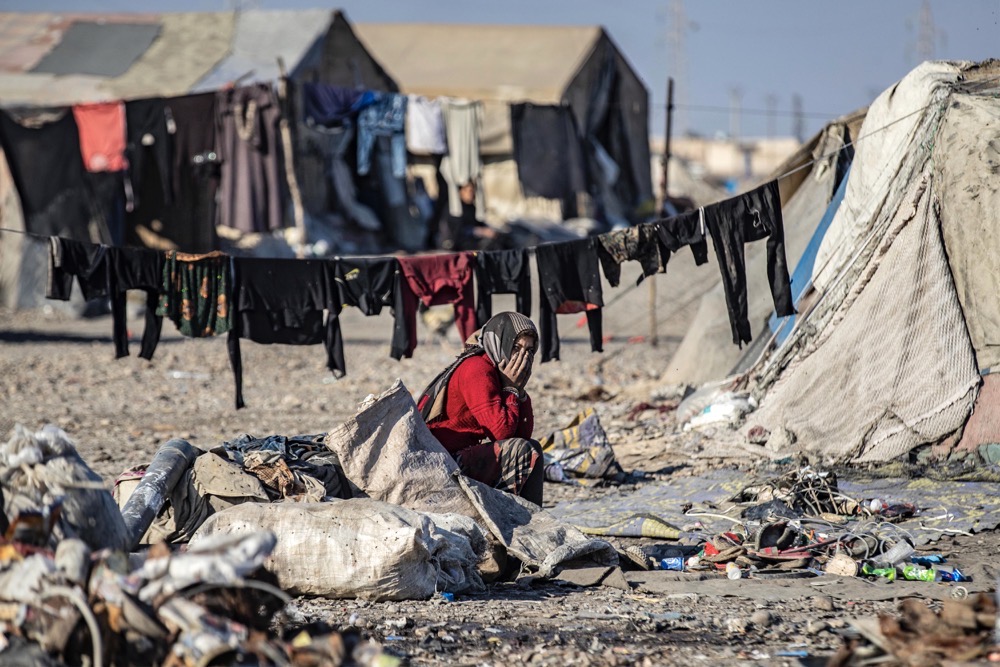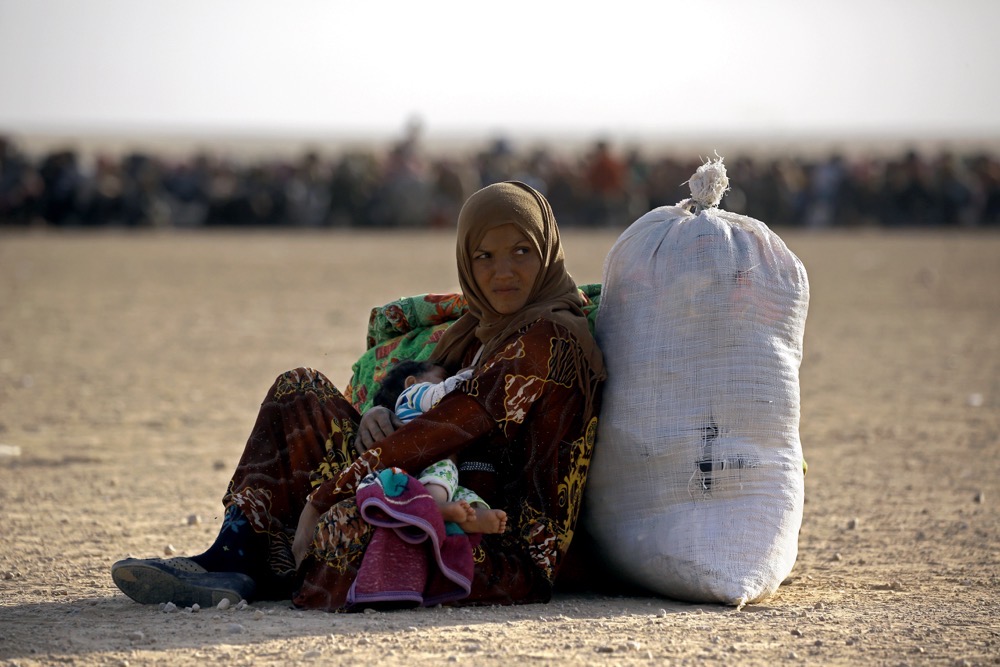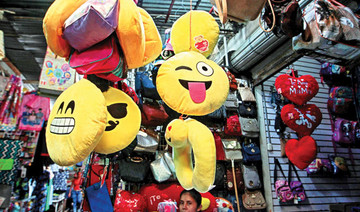LONDON: Every month, women and girls living in camps for displaced people face a common challenge — one that, despite being a natural occurrence, disrupts their daily lives in everything from queuing for meals to participating in social life.
Long a relatively neglected health issue, aid agencies say that poor access to menstrual hygiene management products impacts the lives of millions in the world’s crisis-hit regions, deepening gender inequality.
“The lack of access to menstrual hygiene products and facilities can be a significant barrier to the participation of displaced women and girls in training programs and other activities,” said Samara Atassi, CEO and co-founder of Souriyat Across Borders, a women-led charity that supports refugees and internally displaced people in Jordan, Syria and the UK.
Insufficient access to such products and facilities often forces women and girls to resort to “unhygienic practices, such as using dirty rags, leaves or even sand to manage their periods,” Atassi told Arab News.
Social stigma and embarrassment often pose an additional challenge, leading to “isolation and a sense of shame,” taking a toll on their mental wellbeing, she said. Overcrowding in camps in particular “can lead to a lack of dignity and privacy, which can also impact their mental health.”
Further exacerbating the problem are issues such as inadequate access to clean water, sanitation and hygiene facilities.

A woman sits outside a tent at a camp for those displaced by conflict in the countryside near Syria’s northern city of Raqqa. (AFP/File)
These conditions “can make it difficult to manage menstrual hygiene, further increasing the risk of infections and other health problems,” Sahar Yassin, Oxfam MENA regional gender advocacy adviser, told Arab News.
“Period poverty” is defined as a lack of access to menstrual products, education, hygiene facilities, waste management, or a combination of these.
In 2019, experts from academic institutions, NGOs, governments, UN organizations and elsewhere came together to form the Global Menstrual Collective to research the issue. It defined menstrual health as “a state of complete physical, mental, and social well-being and not merely the absence of disease or infirmity, in relation to the menstrual cycle.”
It noted that people should have access to information about menstruation, life changes and hygiene practices, the ability to care for themselves during menstruation, as well as access to water, sanitation and hygiene services.
It also highlighted the importance of the ability to receive a diagnosis for menstrual cycle disorders and access to health care, a positive, supportive environment in which to make informed decisions, and the ability to participate in all aspects of life, such as going to work and school.
Period poverty affects an estimated 500 million people worldwide — but is perhaps more keenly felt by those who have been forcibly displaced from their homes, or those reaching puberty while living in overcrowded and poorly equipped camp settings.
The UN Refugee Agency estimates that women and girls account for about 50 percent of any displaced or stateless population.
At the end of 2021, the Middle East and North Africa accounted for about 16 million forcibly displaced and stateless people, with the largest numbers fleeing conflict in Syria and Yemen, according to the UNHCR figures.
However, the reproductive health of women and girls in refugee and internal displacement camps continues to face neglect by donors. A 2019 survey by UNHCR found that just 55 percent of women’s needs were met with regard to menstruation products.
Nicola Banks, advocacy manager at the UK-based charity Action for Humanity, told Arab News that the UK had recently reduced “funding for its flagship program on sexual and reproductive health, Women’s Integrated Sexual Health,” which supports marginalized populations in Asia and Africa.
“Cuts to SRHR (sexual and reproductive health and rights) programs ... could result in reduced access to menstrual hygiene products, education and reproductive health services, potentially exacerbating period poverty,” Banks said.

A displaced Iraqi woman who fled Mosul sits with her child as they wait to enter Syria. (AFP/File)
During humanitarian crises, relief and aid efforts are chiefly focused on what are considered the most immediate needs — food, shelter and medicine — while menstrual hygiene products are often ignored, according to a report published in September 2022 by the UN sexual and reproductive health agency, UNFPA.
Another critical challenge to menstrual hygiene management is a lack of education, which can lead to misconceptions about menstruation, further perpetuating stigma and shame, said Atassi of Souriyat Across Borders.
Owing to this pervasive sense of stigma and shame, many girls aged 10-18 in refugee camps in Turkiye continue to have limited access to accurate information about menstruation, meaning few are fully informed before reaching menarche, or the first menstrual cycle, according to the UNFPA report.
The study, “Menstrual hygiene management among refugee women and girls in Turkiye,” emphasized that this important yet vulnerable population lacked a complete and accurate conception of menstruation, with the main source of information being the mother or another female family member.
FASTFACT
55%
A 2019 UNHCR study found that only 55 percent of women’s needs were met in regard to menstruation products.
Oxfam’s Yassin says that this lack of education, combined with period poverty, “is closely linked to gender-based violence in the MENA region, where the cultural taboo surrounding menstruation precludes women and girls from discussing it openly, leading to misinformation and/or lack of information.”
Forms of gender-based violence, or GBV, linked to menstruation include “early marriage, lack of privacy, safety, and sexual harassment,” she said.
To conceal evidence of their menstruation, women in displacement and refugee camps often find themselves forced to venture alone to secluded areas, which exposes them to the potential for sexual violence. But the threat is also present in toilet spaces inside the camps.
A 2021 statement by Filippo Grandi, the UN high commissioner for refugees, revealed that “one in five refugees or internally displaced women have faced sexual violence,” adding that the COVID-19 pandemic aggravated the issue.

Syrian-Kurdish displaced women stand behind a wire fence at the Qushtapa refugee camp. (AFP/File)
“In many cases, GBV is a result of violations of SRHR, such as female genital mutilation/cutting, child marriage, intimate partner violence and non-partner sexual violence,” said Banks of Action for Humanity.
“While education, empowerment, and ending violence are critical components of gender equality, they cannot be addressed in isolation from SRHR.”
For Oxfam’s Yassin, “by addressing period poverty and providing better menstrual hygiene management infrastructure and accessible facilities, we can not only promote gender equality and prevent gender-based violence but also support women’s and girls’ health, economic empowerment and well-being.”
Despite efforts by several NGOs and UN agencies to alleviate the burdens caused by period stigma and poverty, menstrual hygiene management remains a largely unaddressed issue in refugee and displacement camps.
“As an organization that is committed to empowering women, we recognize the importance of providing comprehensive sexual education,” said Atassi of Souriyat Across Borders. “Unfortunately, we currently do not have an education project inside the IDPs camps.
“However, we strive to support women’s health and hygiene needs through all our relief campaigns.
“Even in the emergency response situations, such as during the (Feb. 6 Syria-Turkiye) earthquakes ... we prioritized the inclusion of women’s hygiene baskets in our relief efforts.
“We believe that by addressing women’s basic needs, we can help them feel supported, safe and empowered.”



















